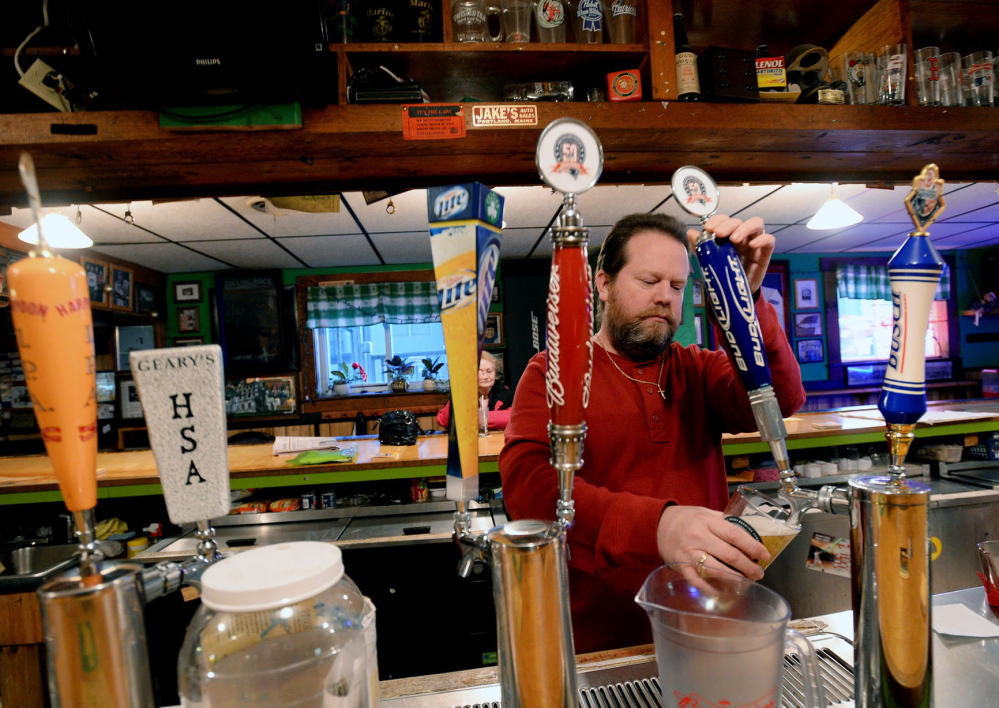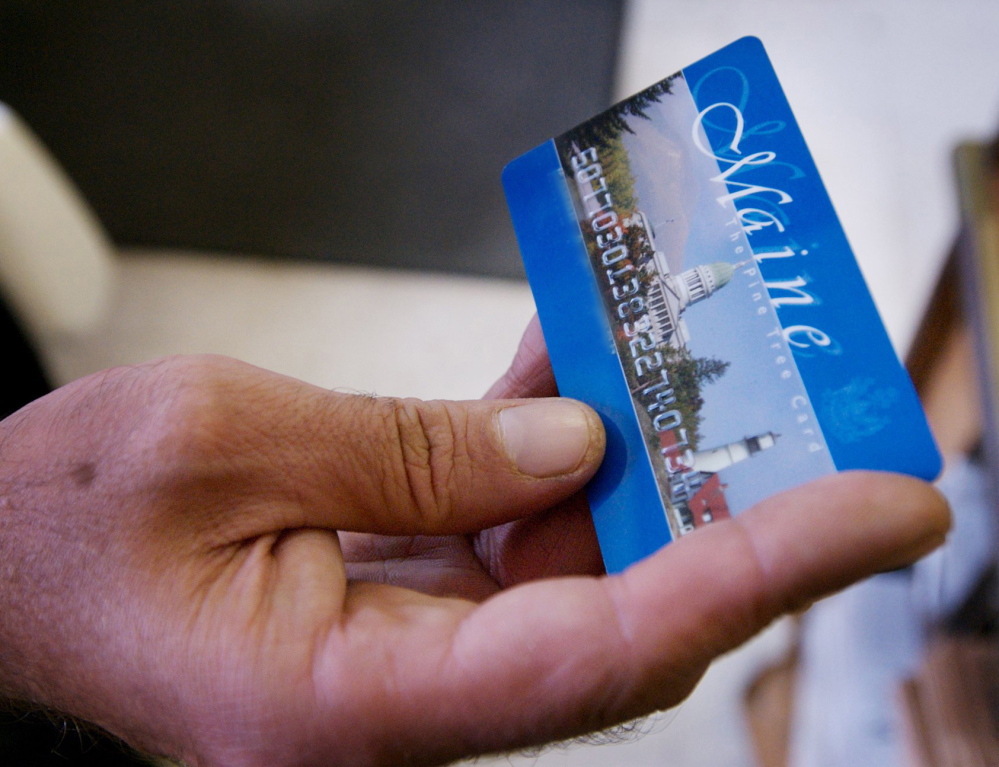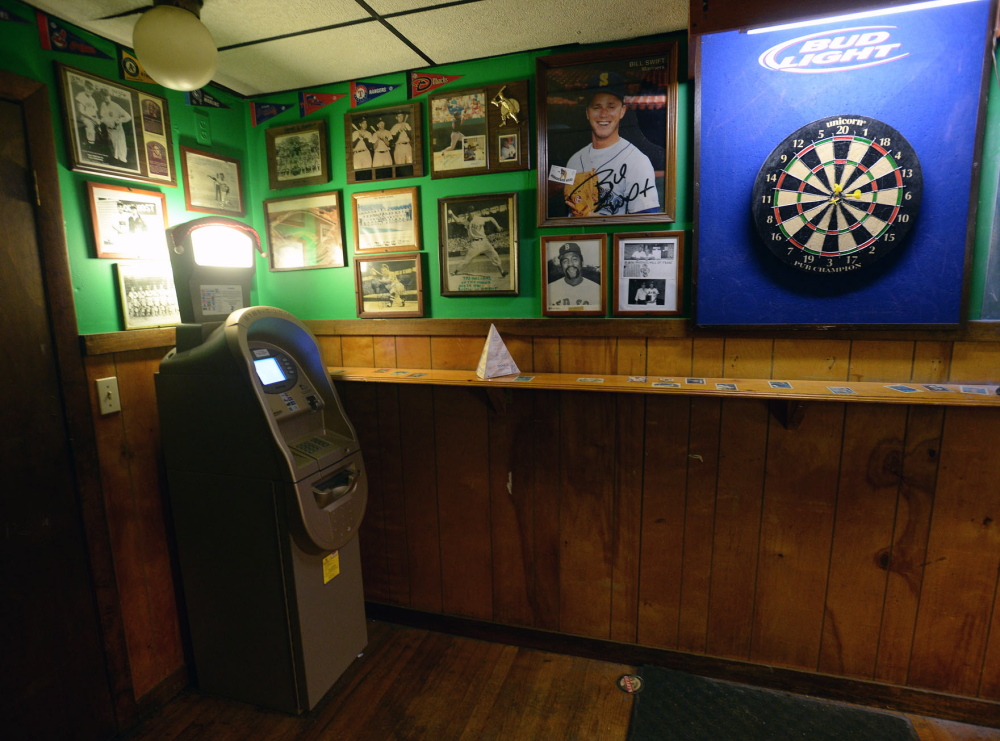The LePage administration released data Tuesday that it says shows Mainers on welfare used Electronic Benefit Transfer cards to make thousands of purchases at bars, smoke shops and liquor stores.
But it’s unclear whether any of the transactions were illegal, because the state said it doesn’t know what was purchased and because many of the businesses have ATMs that card holders can use to make cash withdrawals.
Gov. Paul LePage’s focus on the issue reflects a national controversy over the use of EBT cards, which has led to crackdowns in some states.
LePage, who has targeted welfare fraud and made it an issue in his re-election campaign, said the purchases were a misuse of the EBT cards issued through the Temporary Assistance for Needy Families program.
The data shows that from Jan. 1, 2011, to Nov. 15, 2013, more than 3,000 transactions were made at more than 20 smoke shops, which primarily sell tobacco products. Another 650 transactions occurred at bars, pubs or strip clubs, the data shows.
The administration said the benefit cards were used in all 50 states, including at a liquor store in New Hampshire that had transactions totaling close to $8,000.
Although the data suggests fraud or inappropriate use of benefits, a spokesman for the Department of Health and Human Services, which administers the program, said the state doesn’t know what was purchased with the EBT cards.
Many of the businesses described as smoke shops also function as convenience stores, selling food and other products. Also, many of the businesses have ATMs, so an EBT transaction recorded at a smoke shop or bar may actually be a cash withdrawal from an EBT account.
The DHHS says about 50,000 EBT transactions are made each month. At that rate, there were about 1.725 million transactions made from January 2011 to Nov. 15, 2013, the period when the administration found 3,701 transactions that it says were inappropriate. That means the inappropriate transactions accounted for about two-tenths of 1 percent of all EBT use during that period. There are about 224,000 active EBT cards in Maine, the DHHS says.
LePage’s media release did not include the dollar value of the transactions in question, so it’s not clear how much of the budget for the Temporary Assistance for Needy Families program they represent. The DHHS allocated $192.5 million to the program and its associated work program, ASPIRE, in 2012.
The governor said in a written statement that the data is “eye-opening” and shows that misuse of EBT cards is a larger problem than initially thought.
“These benefits are supposed to help families, children and our most vulnerable Mainers,” LePage said. “Instead, we have discovered welfare benefits are paying for alcohol, cigarettes and other things hardworking taxpayers should not be footing the bill for.”
SPOTTY CONTROL OF BENEFIT USE
In 2012, the governor signed a law that prohibited the use of EBT cards at gambling facilities, strip clubs, and retail establishments where 50 percent or more of the revenue is derived from liquor sales.
The data released by the administration Tuesday suggests that enforcement of that law is not proceeding as intended. It also raises questions about how the state can effectively control the way benefits are spent if the aid program allows recipients to use EBT cards to get cash.
The administration said it is continuing to coordinate efforts by the DHHS, the Bureau of Alcoholic Beverage and Lottery Operations and the Department of Public Safety to identify stores and establishments where EBT transactions are prohibited under the 2012 law.
LePage announced recently that he plans to submit a bill to further restrict where EBT cards can be used. Democratic leaders in the Legislature have expressed a willingness to support the measure.
If the system is being abused, it’s the LePage administration’s fault for not enforcing the law he signed in 2012, said Rep. Richard Farnsworth, D-Portland, the House chair of the Health and Human Services Committee.
He said Democrats don’t oppose laws that prohibit people from using Temporary Assistance for Needy Families to buy alcohol and tobacco or go to adult dance clubs, but he’s seen nothing to indicate that misuse is widespread.
atm use at bars clouds issue
Questions remain about some of the data provided by the administration. Some of the establishments on the list sell items other than cigarettes and alcohol, such as food and gas. The data does not show what was purchased, only the location and the store or establishment.
The Griffin Club, a bar in South Portland, is listed as the source of 11 EBT transactions, but it’s described as a cash-only establishment.
Scott Parker, owner of the Griffin Club, said his business accepts cash only but has an ATM inside. “Unless I was standing there and looking over their shoulder and watching them, I would have no idea” whether someone is using an EBT card to get cash, he said.
Parker said people shouldn’t buy alcohol and cigarettes with their taxpayer-funded welfare cards, but there’s no way for him to know when it’s happening at his club.
“I don’t want that kind of business, and I would be the one making money off of it,” he said.
Howie Chadbourne, who owns Howie’s Pub in Portland, said he doesn’t accept credit cards but he does have an ATM, and people could use EBT cards to get cash and then use it as they wish.
“I don’t have any control over that,” Chadbourne said. “People come in here and use the ATM and leave.”
Sara Gagne-Holmes, executive director of Maine Equal Justice Partners, an advocacy group on issues affecting low-income Mainers, noted that many stores on the administration’s list sell more than alcohol and cigarettes.
“It’s presumptuous to presume these people are somehow misbehaving,” she said.
Many EBT cards are loaded with benefits for two government programs, Temporary Assistance for Needy Families — a cash benefit — and the Supplemental Nutrition Assistance Program, better known as food stamps.
Some foods cannot be bought with food stamps, and the EBT cards are programmed to distinguish purchase codes at 1,500 licensed retailers in Maine.
OTHER STATES FIGHT MISUSE OF CARDS
Misuse of EBT cards is an issue that has surfaced in numerous states.
Kevin Concannon, a former Maine DHHS commissioner who is now the U.S. Department of Agriculture’s undersecretary for food, nutrition and consumer services, said in April that food stamp fraud totals about $750 million a year. That’s more than double the amount that was detected in a study of illegal trafficking from 2006 to 2008.
In 2010, the Los Angeles Times obtained records from the California welfare agency and found that more than $69 million was spent or withdrawn outside the state, including at casinos in Las Vegas, hotels, shops and restaurants.
Guy Christian, president of the nonprofit California Welfare Fraud Investigators Association, whose mission is to curb welfare fraud, said his organization relies less on computers and more on old-fashioned detective work to track and stamp out misuse of EBT cards.
He said the key for states to combat fraud is investing the time and money it takes to staff an enforcement division.
“A lot of our investigations involve going out into the community and knocking on doors,” he said. “Sometimes, you just have to be able to look someone in the eye.”
Christian said the Los Angeles Times article led to changes.
Last year in Maine, the average monthly food stamp benefit was $123, according to the U.S. Department of Agriculture. More than 252,000 residents, about 19 percent of the state’s population, received food stamp benefits, according to the Center on Budget and Policy Priorities.
The Supplemental Nutrition and Assistance Program is mostly federally funded. Last year, the federal government spent $82.5 billion on the program, including $376 million in Maine.
Last year in Maine, the average Temporary Assistance for Needy Families benefit for a single parent with three children was $485 a month. The state spent $3.1 million on the program in December, on 7,509 cases that included about 12,300 children.
Staff writers Joe Lawlor and Dennis Hoey contributed to this report.
Steve Mistler can be contacted at 791-6345 or at:smistler@pressherald.comTwitter: @stevemistler
Send questions/comments to the editors.





Comments are no longer available on this story